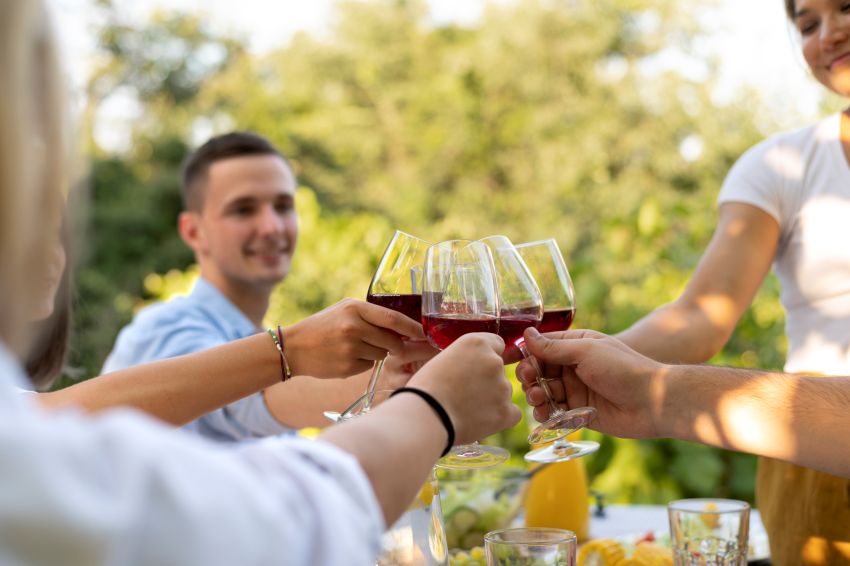Evolving Wine Tourism in 2025: How Spain, Portugal, South Africa, and the UK Are Shaping New Travel Experiences
Wine tourism in Spain, Portugal, South Africa, and the UK is evolving in 2025 with food, culture, and sustainability shaping new travel experiences.
Travellers have long flocked to vineyards to sample wines, take in breathtaking scenery, and get a firsthand look at the winemaking process, making wine tourism a vital component of cultural exploration. However, as the industry is changing due to climate change and producers are being forced to innovate, the conventional wine tasting model is coming under more and more pressure. Because of this, a lot of wine regions are expanding their services to offer more than just wine tasting.
According to WineGB, wine tourism in the UK has grown by an astounding 55% since 2022, showing that there is a greater demand than ever for travel related to wine. Countries like Portugal, Spain, and South Africa are becoming more well-known worldwide for providing excellent value to tourists in 2025. Wine estates are modifying their offerings to stay relevant in a market that is changing quickly, as tourists are seeking out options beyond the traditional tasting tour.
Diversification of Wine Tourism Experiences
Traditional wine tastings, though still popular, are no longer the sole attraction for wine tourists. Across the globe, wine estates are diversifying their experiences, blending food, culture, and entertainment into their wine offerings. This shift in focus is driven not only by the need to offer more varied activities but also by the changing expectations of visitors. As wine estates recognise the importance of creating a holistic experience, they are incorporating gastronomy, art, and even local performances into their activities.
In regions like the UK, Spain, and South Africa, wine estates are increasingly positioning themselves as hospitality destinations rather than just wine producers. This strategic pivot allows them to broaden their appeal, offering something for a wide range of travellers, whether they’re interested in culinary experiences, outdoor adventures, or cultural immersion.
Food-Led Experiences
One of the key trends in wine tourism is the move towards food-led experiences. This shift allows wine estates to engage guests in a more intimate and comprehensive way, drawing them in with a focus on local cuisine and pairing food with wine rather than just focusing on the wine itself. In many wine regions, lunch, dinner, and private dining events are becoming as important as the wine tastings, providing a more well-rounded experience for guests.
By focusing on food and hospitality, estates are also gaining better control over their brand experience. This approach allows them to ensure that guests leave with a greater understanding of the estate’s values, environment, and mission. Additionally, by offering a variety of activities beyond wine tasting, estates are able to increase revenue per guest and foster a more personalised and immersive experience.
In the UK, for example, Hambledon Wine Estate has reported that food-focused events are now a major part of their revenue model, with the estate predicting that hospitality will account for 55% of their income in the next five years. The rise in food-led tourism has also contributed to local economies, with many wine estates partnering with nearby hotels and restaurants to create a more robust tourism ecosystem.
Immersive Cultural Experiences
In regions like Spain’s Rioja and South Africa’s Stellenbosch, wine estates are emphasising cultural experiences alongside traditional wine tourism. These immersive activities aim to deepen visitors’ understanding of the wine culture by engaging all five senses. At Ramón Bilbao in Rioja, new offerings include painting workshops, music events, and even circus performances during larger gatherings. These unique events are designed to blend wine with local culture, giving visitors a deeper connection to the destination.
The focus on experiential tourism helps guests feel more connected to the land, the people, and the culture of wine. Events like sunset vineyard dinners or exclusive food-and-wine pairings in scenic locations have become essential in offering a rich, sensory experience that goes beyond simply sipping wine. By providing these immersive opportunities, wine estates are fostering a sense of loyalty among visitors, turning them into ambassadors for the region and its wines.
Sustainability and the Future of Wine Tourism
While climate change has made some aspects of winemaking more challenging, it has also created an opportunity for estates to focus on sustainability and regenerative tourism practices. Many wine regions are embracing sustainable agriculture and winemaking practices, focusing on the long-term health of the land and its ecosystems. Visitors to these estates are increasingly concerned with sustainability, seeking out experiences that align with their values.
Regenerative tourism, a growing trend in wine tourism, emphasises restoring and protecting natural environments, ensuring that the tourism activities do not harm the land. Wine estates are beginning to incorporate these principles into their operations, giving travellers the chance to engage with the environment in a way that promotes sustainability and responsible consumption.
Looking ahead, wine tourism will continue to play a significant role in attracting new audiences, especially as younger generations seek experiences that align with their values. The focus will likely continue to shift toward more sustainable, immersive, and food-centric experiences, with travellers seeking meaningful connections to the land and the people who produce the wine.
Conclusion
Rapid change is occurring in wine tourism as producers adjust to the shifting demands of consumers. Wine estates all over the world are changing the face of wine tourism by emphasising immersive cultural activities, food-led experiences, and sustainable practices. Portugal, Spain, South Africa, and the UK will continue to be major players in the expanding appeal of wine tourism in 2025 and beyond as these trends continue to gain traction. There are many chances for exploration, education, and enjoyment in these vibrant and changing areas for tourists looking to develop a closer bond with the land, culture, and people that produce their favourite wines.
The post Evolving Wine Tourism in 2025: How Spain, Portugal, South Africa, and the UK Are Shaping New Travel Experiences appeared first on Travel and Tour World


